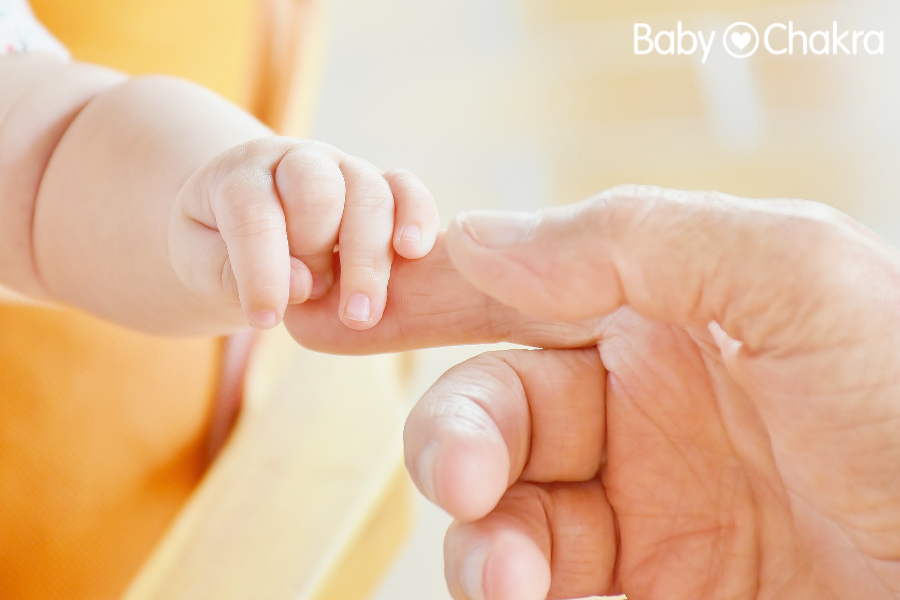
11 Newborn Care Tips For New Mums And Dads
2 Mar 2022 | 9 min Read
Reema Shah
Author | 740 Articles
Whether you are a first-time parent or a veteran, round-the-clock newborn care can turn your life upside down. Which is why, during the first few weeks, some basic newborn care tips can help you enjoy these days without any stress.
Consider these tips to get through the first phase of your journey as a new parent.
Tried and Tested Newborn Care Tips For New Parents
1. Breastfeeding care
Every new mother has a unique breastfeeding experience. For some, it is easy; for others, it can bring along a list of problems including latching issues, blocked ducts, engorgement, and even mastitis.
Knowing how to help your baby latch on properly, as well as learn about the best breastfeeding positions, and ways to relieve engorgement or increase milk supply, can help make this process easier. Besides that, noticing any changes that need attention, checking the moisture balance of the skin, hygiene and proper care are very important to avoid breastfeeding issues such as sore nipples and infection.
Pro tip: If you have blocked ducts or swollen breasts, heat a warming pad and place it lightly on your breast. Follow this up by gently massaging your breasts. This will help relieve pain and also bring down the milk.
2. Limit visitors to your home
This is an exciting and joyful moment, and will bring visitors to your house more frequently. But for good infant care, safety is of utmost importance as infections are quite common.
Limiting visitors who drop by to see the new baby is advisable, especially during the rapid spread of COVID-19. The immune system of new born babies are not yet strong and therefore they are prone to catch infections easily.
Pro tip: Always ask your visitors to sanitize their hands upon entry into your home, and to avoid touching or kissing your newborn. This way you minimise the risk of infection and keep your little one safe.
3. Diaper duty

When it comes to learning newborn tips and tricks, changing diapers is one activity new parents must learn. Babies need to go through multiple diaper changes in a day, so make sure you have enough of these at home.
Experts suggest that parents who use disposable diapers can go through an estimated 3000 per year. Here’s a chart to give you an idea.
| Age | Weight | Daily use | Number of diapers |
| Premature | < 2.7 kgs | As needed | As needed |
| First few weeks only | Up to 4.5 kgs. | 8–12 diapers per day | 2–3 packs or1–2 boxes (based on 140/box) |
| Birth–4 months | 3.6–6.3 kgs | 8–10 diapers per day | 13 packs (about 40/pack) or 3–4 boxes (based on 164/box) |
| 3–8 months | 5.4–8.16 kgs | 8–9 diapers per day | Almost 15 packs (about 37/pack) or 4 boxes (based on 142/box) |
| 5–24 months | 7.2–12.7 kgs | 6–7 per day | About 27 packs (about 36/pack) or 7 boxes (based on 136/box) |
Pro tip: Keep baby wipes and diaper rash cream handy. Your baby might develop nappy rashes since they wear diapers most of the day between the ages of 0 and 2 years, or till they are potty trained.
It is, therefore, recommended that you consult a professional to get a suitable rash cream. Make sure you clean the baby’s genital area properly with a gentle baby wipe and apply diaper rash cream if they have rashes.
4. Holding your baby
Holding your precious little one is one of the most beautiful feelings in life. But it is one that must be done gently. When you pick up your baby, always ensure that you take special care of baby’s soft head, especially around the fontanelles, by supporting the neck and head.
You can do so by sliding one of your hands under the baby’s neck and the other under his bottom. You can bend your knees to protect your back. Once you’ve placed your hands properly, scoop and pick up the baby and bring him close to your chest as you stand.
Make sure that your baby’s head is resting on your chest, while you continue to support the neck and the spine. Holding the baby this way will allow you to make eye contact with your baby.
Pro tip: When you pick up your baby, ensure that you do not hold any other object in your hand. Also, always hold the baby securely when you walk up and down the stairs. Be careful to support the baby’s head and neck as their neck muscles are underdeveloped and they cannot independently support their head.
5. Bathing your newborn

Bathe your baby in warm water by giving them a sponge bath for the first few weeks. Wrap the baby in a towel in a warm room temperature and wipe off each area of the body carefully., while you cover the other areas with the towel to keep them warm.
After your baby is able to sit up on their own (which usually happens when they’re around six-months-old), you can give them a tub bath. Splash hot water on them to keep them warm. Use a mild moisturizing baby wash for the baby’s body and a mild baby shampoo to keep your little one’s hair clean. Wash off the scalp gently to cleanse any spots on the baby’s head.
Pro tip: Be careful while using shampoo and body wash on your baby. Make sure the shampoo does not run into their eyes. Incase some of the shampoo enters your baby’s eyes, make sure you gently wash it or wipe it off. You can even buy a shampoo hat for baby’s bath time to avoid soap or shampoo from running into their eyes. Use only baby safe shampoos and body wash.
6. Comforting your baby
During the first three months babies cry for an average of 2 hours a day. This is quite normal and you need not panic.
Your baby may cry for different reasons, which could be gas or colic. This is their way of showing their feelings and discomfort. They may also do this if they need a nap or are hungry.
Observe your baby to see if they become sensitive to noise, lights or certain activities. Gradually, you will learn why your baby may be crying and you will be able to comfort him/ her accordingly.
Pro tip: While most babies stop crying when they are picked up and comfortable in the mother’s lap or are being bounced, cuddled or rocked. What one must remember is to firstly avoid rocking the baby too hard and most importantly, let your baby learn to self soothe, unless you feel the baby is crying too much and is uncomfortable. Let baby learn to sleep on their own without being rocked around.
7. Baby Massage

A massage is a crucial step to comfort your baby, increase skin-to-skin contact and bonding, and most importantly, it enhances their sleep patterns. The digestion system also improves along with increasing blood circulation in the body.
Use a natural baby massage oil that is safe for the baby’s skin. Massage the baby once a day for a around 15 minutes.
Pro tip: Choose a flat and comfortable surface for the baby to lie down. Use soft and gentle strokes while massaging a newborn. Once you are done with the front, flip baby over and gently massage their back as well. As soon as your baby starts fussing, make sure you stop the massage. It’s a sign that they are either sleepy, cold, hungry or just bored.
8. Monitoring your baby
Babies can roll over as early as two-months-old. Since this is a natural process and differs in each baby, you may not know when your baby starts doing this.
To avoid any accidents that might hurt your baby, never leave the baby unattended in the crib or the bath tub.
Pro tip: The baby’s crib should be placed in a way in where the parent can keep a watch even if they need to take care of any other chores around the house and there’s no one else to monitor the baby. Don’t hesitate to ask for help, if you’re unable to leave your baby unattended.

9. Bonding with baby
Talking to the baby while you change them or bathe them is one of the best ways to bond with your baby. It also helps in developing their brains better. Th baby’s brain soaks up the tone, language and sound. When you talk to your baby often, it helps them to form a stronger conversational and language skills.
Pro tip: You can talk to your baby about anything, the mundane things you’re doing around the house, or about how the baby makes you happy, or you can just sing to them. or even play peek-a-boo. Keep your tone soft and calm while you do that.
10. Milk bottles
Newborns are more susceptible to infections and so you must maintain proper hygiene at home. The milk bottles and breast pumps need to be cleaned well and sterilized at least twice a day.
Hepatitis A Virus and Rotavirus–both of which are commonly transferred through poor sanitation practices–might infect unsanitized baby bottles and therefore, your baby.
If possible, clean the milk bottle before each feeding session.
Pro tip: To sterilise the baby bottle, if you don’t have a steriliser, soak the bottles in hot water with a few drops of vinegar. You must ensure that all parts of the baby bottle are properly separated and then washed and dried
11. Dressing your baby
Your baby needs warmth, but overdoing it can cause discomfort. Check on them often to see if they are sweating, as this can make them feel irritated and cranky.
Pro tip: Jumpsuits with zips can be an easy way to dress your baby. But ensure that they are made of breathable natural fiber and are comfortable, clean and gentle on your baby’s soft and delicate skin.
While all these tips will help you take care of your new born baby, it is important to remember that nurturing and caring for a baby is not the mother’s job alone, a father must actively take part in caring for the baby.
A


Related Topics for you
Suggestions offered by doctors on BabyChakra are of advisory nature i.e., for educational and informational purposes only. Content posted on, created for, or compiled by BabyChakra is not intended or designed to replace your doctor's independent judgment about any symptom, condition, or the appropriateness or risks of a procedure or treatment for a given person.
